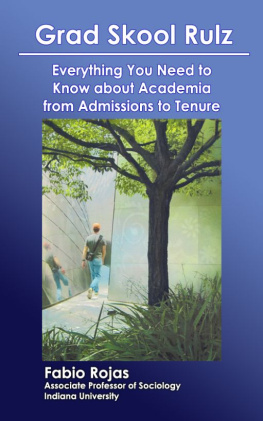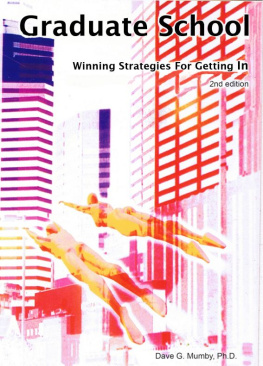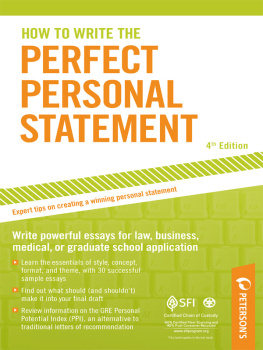Rojas - Grad skool rulz everything you need to know about academia from admissions to tenure
Here you can read online Rojas - Grad skool rulz everything you need to know about academia from admissions to tenure full text of the book (entire story) in english for free. Download pdf and epub, get meaning, cover and reviews about this ebook. publisher: Fabio Rojas, genre: Romance novel. Description of the work, (preface) as well as reviews are available. Best literature library LitArk.com created for fans of good reading and offers a wide selection of genres:
Romance novel
Science fiction
Adventure
Detective
Science
History
Home and family
Prose
Art
Politics
Computer
Non-fiction
Religion
Business
Children
Humor
Choose a favorite category and find really read worthwhile books. Enjoy immersion in the world of imagination, feel the emotions of the characters or learn something new for yourself, make an fascinating discovery.
- Book:Grad skool rulz everything you need to know about academia from admissions to tenure
- Author:
- Publisher:Fabio Rojas
- Genre:
- Rating:5 / 5
- Favourites:Add to favourites
- Your mark:
- 100
- 1
- 2
- 3
- 4
- 5
Grad skool rulz everything you need to know about academia from admissions to tenure: summary, description and annotation
We offer to read an annotation, description, summary or preface (depends on what the author of the book "Grad skool rulz everything you need to know about academia from admissions to tenure" wrote himself). If you haven't found the necessary information about the book — write in the comments, we will try to find it.
Rojas: author's other books
Who wrote Grad skool rulz everything you need to know about academia from admissions to tenure? Find out the surname, the name of the author of the book and a list of all author's works by series.
Grad skool rulz everything you need to know about academia from admissions to tenure — read online for free the complete book (whole text) full work
Below is the text of the book, divided by pages. System saving the place of the last page read, allows you to conveniently read the book "Grad skool rulz everything you need to know about academia from admissions to tenure" online for free, without having to search again every time where you left off. Put a bookmark, and you can go to the page where you finished reading at any time.
Font size:
Interval:
Bookmark:
GRAD SKOOL RULZ:
WHAT YOU NEED TO KNOW ABOUT ACADEMIAFROM ADMISSIONS TO TENURE
by
Fabio Rojas
Smashwords Editions
* * * * *
PUBLISHED BY:
Fabio Rojas on Smashwords
The Grad Skool Rulz:
What You Need to Know about Academiafrom Getting In to Getting Tenure
Copyright 2011 by FabioRojas
Smashwords Edition LicenseNotes
This ebook is licensed for yourpersonal enjoyment only. This ebook may not be re-sold or givenaway to other people. If you would like to share this book withanother person, please purchase an additional copy for each personyou share it with. If you're reading this book and did not purchaseit, or it was not purchased for your use only, then you shouldreturn to Smashwords.com and purchase your own copy. Thank you forrespecting the author's work.
* * * * *
Table ofContents
* * * * *
THE GRAD SKOOL RULZ:
WHAT YOU NEED TO KNOW ABOUT ACADEMIAFROM GETTING IN TO GETTING TENURE
Does graduate school confuse you? Have you spent too manyyears as a graduate student? Do you feel that there are invisiblerules that everyone else knows, but you dont? You are not alone. Ifelt the same way. I was in graduate school for a long time. I wasconfused and anxious. I often asked myself if there was some sortof handbook that would answer my questions or guide me. If I everfinished graduate school, I promised that I would write downeverything that I learned so that other people would learn from mymistakes. People might have a resource that explains how graduateschool works. If nothing else, a few people might finish theirdoctoral program a little quicker.
Life improved and I graduated with mydoctoral degree in 2003. I began teaching at Indiana University. In2005, two young assistant professors, Brayden King and Teppo Felinand a graduate student, Omar Lizardo, asked me to join their newacademic blog, orgtheory.net. The blog is mostly about sociology,but I had the freedom to write on any topic. In addition to socialscience research, I began writing an occasional column called TheGrad Skool Rulz. Every once in a while, Id write a blog post onvarious graduate school topics, such as writing the dissertation ordoing a job talk. Eventually, I decided to write a post on everygraduate school topic I could imagine.
Soon, the Grad Skool Rulz attracted afollowing. Thousands of people have read the Rulz. At conferences,people talk to me about the Rulz. Clearly, the Rulz were working.Friends suggested a book. Untenured, it would have been a baddecision to spend time on a book that was not oriented towardresearch. Fortunately, I was promoted and I now have more freedomto choose my work. Academic research is still my focus, but Idecided to spend some time compiling the Rulz into one text. Iadded material for post-doctoral workers and assistantprofessors.
The remainder of this introductionaddresses two topics: Who is this book for? And, what will I getout of this book? First, this book is intended for doctoralstudents. These are students who are pursuing the advanced researchdegree in a university the doctoral degree. This book is notintended for law students, medical students, terminal mastersdegree students, or any other post-graduate student who is in aprogram with clearly defined enrollment (e.g. two years for theM.B.A.) and lacks a major research project. This is a book forpeople who are on the Ph.D. track and are aiming for tenure trackjobs.
Second, this books major strength isthat it is blunt. Many graduate school advice books are valuable,and I recommend that you read them, but they are written in a verycareful manner that obscures obvious truths. Instead, here, I amdirect. For example, the very first section of this book is calledDo Not Go to Graduate School because there are too many graduatestudents. Departments and universities need young people to teachand run laboratories, but offer few incentives for timelygraduation. My personal history is another strength. I made someserious errors in graduate school. To survive, I really had tothink about how the academic job works. Finally, my book is fairlydetailed. I discuss a lot of details that you wont find in othertexts.
As you work through the Rulz, keep afew things in mind. First, these rules were originally written forsocial science graduate students. I trust that you will beresourceful enough to adjust the advice for your own situation.Second, this book is aimed at students in American universities.Graduate education works differently in other nations, but I hopethat the advice will still be useful for readers in other parts ofthe world. Third, this text reflects my own judgment andexperience. The book contains some unorthodox opinions. Please dosome additional research before you make any major decisions aboutyour career.
* * * * *
The following people provided much needed criticism, editing,and close reading: Katherine C. Chen, Melissa Pirkey, RobertWuebker, Richard Tee, Catherine Bolzendahl, Simone Mariconda,Carson Byrd, and Mary Nell Trautner. The chapter on developingintellectual taste emerged from a blog post and discussion withOmar Lizardo. Beth Duckles was extremely helpful in editingpassages on teaching and liberal arts colleges. Sean Medina helpedme compile all the Rulz into a single document and researched theself-publication process. My co-bloggers provided a wonderfulenvironment for experimenting with an academic advice column:Kieran Healy, Brayden King, Omar Lizardo, Teppo Felin, and SeanSafford. The orgtheory readers also provided much needed debate andcommentary: jimi adams, Thomas Basbll, Bedhaya, Jessica Collett,Tina Fetner, Jeremy Freese, Benjamin Greer, Dan Hirschman, SteveHorowitz, Guillermo, Shamus Khan, Caroline Lee, Jenn Lena, Jordi,Jacob T. Levy, mike3550, musa, Michael F. Marotta, Josh McCabe, DanMyers, olderwoman, Christine Percheski, Brian Pitt, RichardPointer, Gabriel Rossman, sd, Trey, and Chris Uggen. I also thankmy colleagues at Indiana University for showing me a well-rundoctoral program, and my graduate advisors for their help during myacademic training. Kirby Schroeder designed the cover for thee-book. I thank my spouse, Elizabeth H. Pisares, for her love,faith, and companionship. I thank Merlyn for being a littlewizard.
* * * * *
College is usually the end of formal education for mostpeople. However, every year people continue to graduate school.In this chapter, Ill tell you what graduate school is, how to getin, and whether you should go. In general, I recommend againstgraduate school. The Ph.D. is expensive in terms of money and timeand many graduate programs are poorly run. The doctoral degreeprepares you for academic research but rarely confers skills thatwould be useful in other jobs. Some non-academic employers even seethe Ph.D. as a liability. Therefore, you should not go to graduateschool unless you have an exceptionally strong belief that being aprofessor is the right career for you. Even in the sciences, therearent enough teaching positions and schools cant absorb allrecent Ph.D.s. Many science Ph.D. holders will find jobs inindustry.
Lets get started: What is graduateschool? Its simply any additional formal education beyond thebachelors degree. In general, there are two types of graduateeducation, professional and academic.
Professional graduate school you aretrained for a specific job, like being a doctor or lawyer.Professional degrees include the M.D. (medical doctor), M.B.A.(masters of business administration) or the M.F.A. (masters of finearts).
Academic graduate school you aretrained to create new knowledge in a specific area. Most will teachin a college or university setting. Typical degrees: M.A. (mastersof arts), Ph.D. (doctor of philosophy), Sc.D. (doctor ofscience).
The big difference betweenprofessional and academic graduate school is research . The medical student doesnot have to show she can discover new things. Shes learningspecific skills that will solve specific problems. The Ph.D.program demands that you to discover something new before you getthe degree. This book is about the Ph.D. degree program.
Next pageFont size:
Interval:
Bookmark:
Similar books «Grad skool rulz everything you need to know about academia from admissions to tenure»
Look at similar books to Grad skool rulz everything you need to know about academia from admissions to tenure. We have selected literature similar in name and meaning in the hope of providing readers with more options to find new, interesting, not yet read works.
Discussion, reviews of the book Grad skool rulz everything you need to know about academia from admissions to tenure and just readers' own opinions. Leave your comments, write what you think about the work, its meaning or the main characters. Specify what exactly you liked and what you didn't like, and why you think so.





![Reding - Grads Guide to Graduate Admissions Essays] : Examples from Real Students Who Got into Top Schools](/uploads/posts/book/101661/thumbs/reding-grad-s-guide-to-graduate-admissions.jpg)